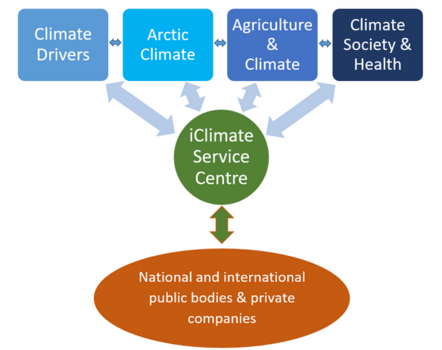iClimate is an interdisciplinary center headquartered at the Department of Environmental Science at Aarhus University.
The center has various research areas, one of which is aimed at the climate of the Arctic.

The main purpose of the research column "Arctic Climate" is to understand the special processes in the Arctic that are central to understanding global temperature changes. This includes feedback mechanisms that accelerate Arctic warming and the interplay between Arctic and global climate change, including the role of the Arctic as a sentinal for global climate change. The main question is how and whether these feedback processes accelerate climate change in general, and how the link to the global climate system is connected. This is especially important now as we approach sea-free summers in the Arctic Ocean, which give rise to increased human activities in the Arctic such as oil prospecting, new shipping routes to Asia and mining. It is of particular interest to the Kingdom of Denmark in connection with territorial interests in the Arctic Ocean and Greenland. The research focuses on the physical, chemical and biological processes that are important for climate change in the Arctic. There are long measurement series for the Arctic and especially the possibility of performing new experiments e.g. at the new large infrastructure at Villum Research Station is central to the center. Field measurements, laboratory tests, monitoring data, climate models and atmospheric chemical transport modeling of short-lived climate indicators (eg black carbon, ozone and methane) and CO2 are used. The focus is on the natural environments, including the North Atlantic and Arctic seas, the Greenlandic coastal waters and sediments, freshwater environments, dry lowlands, areas with low nutrient content in the Arctic as rocks and the surface of the Greenland ice sheet. At iClimate, research is carried out e.g. related to the importance of the global climate system including heat transport to the Arctic and warming within the Arctic as well as examining climate reinforcements, including the melting cryosphere, changing albedo and stratification of the lower atmosphere. The focus is also on feedback between air pollution and climate with a possible climate flow including long-distance transport and changing atmospheric Arctic processes in air, sea, ice and biosphere and the impact of microbiology on e.g. sea ice albedo, greenhouse gas exchange and cloud formation.